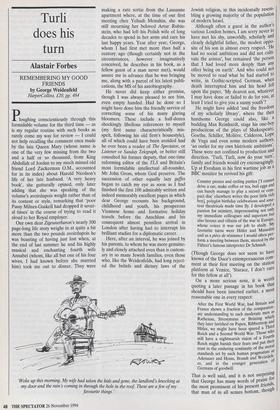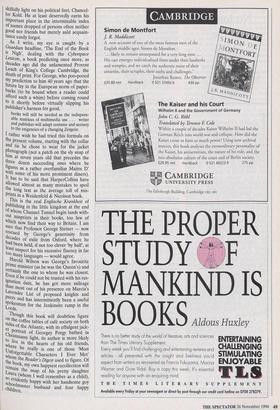Turli does his turn
Alastair Forbes
REMEMBERING MY GOOD FRIENDS by George Weidenfeld HarperCollins, £20, pp. 484 toughing conscientiously through this formidable volume for the third time — as is my regular routine with such books as rarely come my way for review — I could not help recalling the comment once made by the late Queen Mary (whose name is one of the very few missing from the two and a half or so thousand, from King Abdullah of Jordan to my much missed old friend Lord Zuckerman 0.M., accounted for in its index) about Harold Nicolson's life of her late husband. 'A very heavy book', she gutturally opined, only later adding that she was speaking of the volume's avoirdupois weight rather than of its content or style, remarking that 'poor Pussy Milnes-Gaskell had dropped it sever- al times' in the course of trying to read it aloud to her Royal employer.
Our own dear Zigeunerbaron's nearly 500 page-long life story weighs in at quite a bit more than the two pounds avoirdupois he was boasting of having just lost when, at the end of last summer he and his highly musical and enchanting fourth wife Annabel (whom, like all but one of his four wives, I had known before she married him) took me out to dinner. They were making a rare sortie from the Lausanne apartment where, at the time of our first meeting chez Yehudi Menuhin, she was still mourning her beloved Artur Rubin- stein, who had left his Polish wife of long decades to spend in her arms and care his last happy years. Year after year, George, whom I had first met more than half a century ago (though certainly not in the circumstances, however imaginatively conceived, he describes in his book, as a fellow guest of a man never met), would assure me in advance that he was bringing me, along with a parcel of his latest publi- cations, the MS of his autobiography.
He never did keep either promise, though I was always pleased to see him, even empty handed. Had he done so I might have done him the friendly service of correcting some of his many glaring bloomers. These include a half-dozen shockingly libellous references to myself (my first name characteristically mis- spelt, following his old firm's housestyle), all of which could have been avoided had he ever been a reader of The Spectator, or Listener or Sunday Telegraph, or better still consulted his former deputy, that one-time reforming editor of the TLS and Britain's most formidable intellectual all-rounder, Mr John Gross, whom God preserve. The succession of other equally lazy gaffes began to catch my eye as soon as I had finished the first 100 admirably written and indeed memorably excellent pages in which dear George recounts his background, childhood and youth, his prosperous Viennese home and formative holiday travels before the Anschluss and his consequent almost penniless arrival in London after having had to interrupt his brilliant studies for a diplomatic career.
Here, after an interval, he was joined by his parents, to whom he was more genuine- ly and closely attached even than is custom- ary in so many Jewish families, even those who, like the Weidenfelds, had long reject- ed the beliefs and dietary laws of the Woke up this morning. My wife had taken the kids and gone, the landlord's knocking at my door and the rain's coming in through the hole in the roof. These are a few of my favourite things.' Jewish religion, in this incidentally resem- bling a growing majority of the population of modern Israel.
Although often a guest in the author's various London homes, I am sorry never to have met his shy, unworldly, scholarly and clearly delightful father, the modest oppo- site of his son in almost every respect. `He had no social ambitions and did not culti- vate the aristos', but remained 'the person that I had loved more deeply than any other being on earth'. And who could not be moved to read what he had started to write, in Gothic-scripted German, when death interrupted him and his head fell upon the paper, 'My dearest son, whatever I may have done or failed to do for you, at least I tried to give you a sunny youth'? He might have added 'and the freedom of my scholarly library', where the then handsome George could also, like a budding Max Reinhardt, stage his one-boy productions of the plays of Shakespeare, Goethe, Schiller, Moliere, Calderon, Lope de Vega and even some modem authors, `an outlet for my own histrionic ambitions'. These were not confined to production and direction. `Turli, Turli, now do your turn family and friends would cry encouraginglY. Up at Evesham in his first wartime job as a BBC monitor he revived his gift: Country picnics and cycling parties ['I cannot drive a car, make coffee or tea, boil eggs and can barely manage to play a record or coin' pact disc' elsewhere writes the poor little rich boy], polyglot birthday celebrations and ama- teur theatricals made time fly. I developed a passion for mimicry, impersonating not only my immediate colleagues and superiors but also heroes and villains of the war in EuroPe, whose voices it was our job to study- ls4Y, favourite turns were Hitler and Mussolini and as a piece de resistance I would often per- form a meeting between them, steered by the Ffihrer's famous interpreter Dr Schmidt.
(Though George does not seem to have known of the Duce's extemporaneous com- ment at their first meeting on the station platform at Venice, `Starace, I don't care for this fellow at all'). On a more serious note, it is worth quoting a later passage in his book that should have been inserted earlier, a most reasonable one in every respect: After the First World War, had Britain and France shown a fraction of the compassion- ate understanding to such moderate men as Rathenau, Stresemann or Bruning which they later lavished on Papen, Ribbentrop and Hitler, we might have been spared a Third Reich and a Second World War. Those who still have a nightmarish vision of a Fourth Reich might banish their fears and put their trust in the enduring continuity of the moral standards set by such human pragmatists as Adenauer and Heuss, Brandt and Weizsack: er, and in the younger generation
Germans of goodwill.
That is well said, and it is not surprising that George has many words of praise for the most prominent of his present friends, that man of in all senses bottom, though
skilfully light on his political feet, Chancel- lor Kohl. He at least deservedly earns his important place in the interminable index of names dropped of persons often neither good nor friends but merely auld acquain- tance easily forgot.
As I write, my eye is caught by a Guardian headline, 'The End of the Book is Nigh', dealing with the Cyberspace Lexicon, a book predicting once more, as decades ago did the unlamented Provost Leach of King's College Cambridge, the death of print. For George, who poo-pooed my prediction to him 40 years ago that the future lay in the European norm of paper- backs (to be bound when a reader could afford such a whim) before coming round to it shortly before virtually slipping his publisher's harness for good, books will still be needed as the indispens- able matrices of multimedia use . . . writer and publisher will adapt costume and scenery to the exigencies of a changing Zeitgeist. I rather wish he had tried this formula on the present volume, starting with the collar and tie he chose to wear for the jacket Photograph (not a patch on the sly snap of him at seven years old that precedes the three dozen succeeding ones where he figures as a rather overfamiliar Maitre D' with some of his more prominent diners). It has to be said that HarperCollins have allowed almost as many mistakes to spoil the long text as the average toll of mis- prints in a Weidenfeld & Nicolson book.
This is the real Englische Krankheit of Publishing in the little kingdom at the end of whose Channel Tunnel begin lands with- out misprints in their books, too few of which now find their way to Britain. I am sure that Professor George Steiner — now rescued by George's generosity from decades of exile from Oxford, where he had been held, if not too clever 'by half, at least suspect for his excessive fluency in far too many languages — would agree. Harold Wilson was George's favourite prime minister (as he was the Queen's) and certainly the one to whom he was closest. Even if he could not be trusted with his res- ignation date, he has got more mileage than most out of his presence on Marcia's Lavender List of proposed knights and Peers and has intermittently been a useful spokesman for the Jenkinsite rump in the
Lords.
Though this book will doubtless figure on the coffee tables of café society on both sides of the Atlantic, with its effulgent jack- et portrait of Georgey Porgy bathed in Christmassy light, its author is more likely to live in the hearts of his old friends, Where he really is one of those 'Most Unforgettable Characters I Ever Met' whom the Reader's Digest used to figure. Of the book, my own happiest recollection will remain the snap of his pretty daughter Laura (whom I well remember as a child), so evidently happy with her handsome goy
schoolmaster husband and four happy children.











































































 Previous page
Previous page